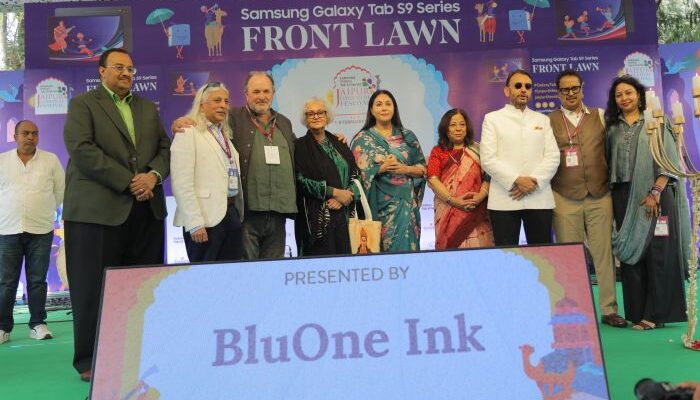The 17th edition of the Jaipur Literature Festival (JLF) commenced and concluded with grandeur and intellectual fervour, that drew together a constellation of literary luminaries, thinkers, and activists from across the globe.
To begin with, Sanjoy Roy, Festival Producer and Managing Director of Teamwork Arts, recalled the growth of the Festival from Diggi Palace to Clarks Amer, spreading its footprints across the globe to the United States and London. He emphasised the green initiatives the Festival has taken on in its 17th edition in collaboration with ReNew Power and the United Nations India Office. Roy said, “The planet is under stress, and we have people coming from all over the world. The idea, the aim is that we will make this a carbon neutral and a waste neutral festival.”
Historian and author Peter Frankopan set the stage for introspection with his illuminating discourse on his latest work, “The Earth Transformed: An Untold History.” Frankopan articulated concerns regarding the depletion of nature, loss of biodiversity, and the oversight of geological influences on human history. By urging attendees to consider the weather conditions shaping historical events, Frankopan challenged conventional narratives of human-centric history. He spoke about the idea of history being of a certain kind, one that only includes stories of humans but not the natural factors that influence their lives. We all go through thinking about the past without ever considering weather conditions.”
You may also like to read – Need to make agricultural research demand driven with private sector engagement: Dr. Rajeev Varshney, Murdoch University
Furthermore, at a session, renowned economist, Raghuram Rajan, along with co-author Rohit Lamba, shared insights from their latest book, ‘Breaking the Mould.’ Their discussion with Naushad Forbes emphasised the necessity of exploring unconventional pathways for India’s economic growth, emphasising the pivotal role of education and social mobility.
At a session, centred around celebrated writer Katherine Rundell’s work, The Golden Mole: And Other Living Treasure, interesting dimensions of other intelligent creatures of the world surfaced. About that, she said, “The greatest lie that humanity has ever told is that the world is ours.” She aimed to write something that would express the astonishing intelligence of the different species on earth. From pandas to elephants to rhinos, she introduced the audience to the numerous marvels that go unnoticed within nature. The session ended with her marvelling at the multitudes of things the world is yet to discover about other living creatures.
A thought-provoking dialogue unfolded on the nature of democracy in India, with speakers SY Quraishi, Girish Kuber, and Yascha Mounk. They reflected on India’s democratic journey as an audacious experiment and emphasised the importance of political plurality and citizen engagement in sustaining democratic ideals.
You may also like to read – More intelligent AI algorithms for the agriculture sector coming soon: Mohit Pande, CBO, CropIn
It was very enlightening to hear Navdeep Suri and Malcolm Turnbull who reminisced about their respective tenures as the High Commissioner of India to Australia and the Prime Minister of Australia, respectively. Turnbull highlighted the diversity and multiculturalism within the continent of Australia that made his time memorable, saying, “Our greatest assets are not under the ground but walking on top of it. And so, we have to be very careful always to have zero tolerance for hate speech, zero tolerance for people who seek to drive division and ensure that we maintain strong, mutual respect among all of our citizens.”
He spoke about how his government developed the idea of essential structures that would stop Australia from falling into the traps of commercial espionage, carefully laid out by China. Further, continuing on the theme of political influence wielded by the media, Turnbull spoke about the balance between freedom of speech and expression of the media and their ability to influence the masses. While freedom of speech is necessary, he said, so is the need for accurate information.
You may also like to read – Aquaconnect inks MoU with StartupTN to promote blue economy initiatives in Tamil Nadu
Introducing a new venue, Nand Ghar, underscored the festival’s commitment to social impact. This flagship project under the Anil Agarwal Foundation aims to transform the lives of millions of children and women across India, embodying the festival’s ethos of inclusivity and empowerment.
Diverse sessions, including discussions on the decision-making processes of Prime Ministers, the intelligence of non-human species, and the interconnections of migration across time, offered attendees a multifaceted exploration of pressing global issues and cultural phenomena.
The Jaipur Literature Festival 2024 emerged as a crucible of intellectual exchange, cultural celebration, and environmental stewardship. Through captivating dialogues, introspective discussions, and innovative initiatives, the Jaipur Literature Festival once again affirmed its status as the premier global platform for dialogue, enlightenment, and societal transformation. As the festival drew to a close, attendees departed enriched, inspired, and poised to navigate the complexities of an ever-transforming world. They hugely appreciated the green initiatives of the festival and the concerns expressed by authors on the depletion of nature.

